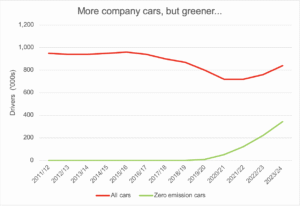New research from HMRC show company cars are becoming more common – and greener.

Source: HMRC
Recent statistics issued by HMRC show that company car ownership (the top line) is enjoying a revival after a 25% fall between 2015/16 and 2020/21. The reason for the increase is largely explained by the second line, which shows electric company car ownership.
As recently as 2018/19, less than one company car in two hundred was a zero-emission vehicle:
- By 2023/24 (the latest data), the proportion had changed to about two in every five.
- Over the same period, the diesel share of the company car population dropped from over two in three to just one in eight.
The switch to green does not signify that company car drivers are becoming environmentalists over the decade. Instead, it is a clear demonstration of how tax changes can drive behavioural change:
- In April 2017, HMRC introduced a new approach to taxing company cars that were provided under salary sacrifice or similar arrangements. In many instances, the new regime, called Optional Remuneration Arrangement (OpRA), made salary sacrifice less attractive because it ended up basing the personal tax on the company car regime rather than, as previously, the amount of salary foregone. To encourage take-up of low-emission cars, an exclusion was carved out for cars with CO2 emissions of up to 75g/km (of which there were very few at the time).
- In 2020/21, the benefit-in-kind percentage charge on zero-emission cars was cut from 16% to 0%. Thereafter, for the next two years, it rose by 1% a year, reaching 2% in 2022/23 and staying at that level until a further 1% rise to 3% for the current tax year, 2025/26. In contrast, a petrol car with 100g/km of CO2 emissions saw its scale percentage rise marginally from 24% in 2019/20 to 25% currently.
The combination of inducements has proved almost too successful: the total taxable value of all company cars fell from £5.43 billion in 2019/20 to £3.27 billion in 2023/24. Now, however, the percentage scale charge for zero-emission cars is on the increase and by 2029/30, it will be 9% – three times the current level. It may still be worth considering salary sacrifice for an electric company car, but the tax calculations will not be as favourable.
The We offer a free General Financial Review for all potential clients, during which we discuss your circumstances, objectives and how we can help. For more information or to book your complimentary appointment, please call us on 01872 301116.
The value of your investment and any income from it can go down as well as up and you may not get back the full amount you invested. All statements concerning the tax treatment of products and their benefits are based on our understanding of current tax law, financial planning strategies and HM Revenue and Customs practice. Levels and bases of tax relief are subject to change and vary according to individual circumstances. Investing in shares should be regarded as a long-term investment and should fit in with your overall attitude to risk and financial circumstances. Past performance does not guarantee future performance. Every effort has been made to ensure the information in this post is accurate at the time of being published. The Financial Conduct Authority does not regulate tax or will advice.